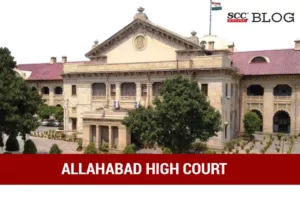Allahabad High Court: In a bail application filed praying to release the accused on bail for offences under Sections 306, 504 and 506 of the Penal Code, 1860 (‘IPC’), during pendency of trial, Siddharth,J. while granting bail to the accused said that said that the accused was implicated for committing the offence of abetment of suicide of the deceased, but the ingredients of constituting such an offence also do not appear to be made out against him.
In the case at hand, the prosecution case is that the applicant and the daughter of informant were having a love affair. The accused and co-accused persons had threatened the informant and her husband due to which her husband went into depression and died in 2021 due to heart-attack. It is further alleged that on 27-10-2021, the accused and co-accused persons entered the house of the informant and threatened them, and an FIR was registered for offences under Section 504, 506 was registered against them. It was further alleged that due to threats extended by the accused, the daughter of the informant had given Rs. 1 lakh to him. On 08-05-2022, she was kidnapped and raped by the accused and other co-accused persons for four days because of which she suffered depression. She was again abducted on 09-06-2022 and thereafter, left in the market. She met her sister and informed her that she has been given something intoxicating to drink and thereafter she was subjected to rape by the accused persons who made her video also. Thereafter, she became unconscious and taken to hospital where she died on 10-06-2022.
Analysis:
After hearing the arguments of the accused, the Court found that this case is where the deceased had an initial affair with the accused and both wanted to marry, but family members of deceased came in their way. Thereafter the victim developed a relationship with another boy, but the relationship with the accused does not appear to have been fully broken. Between the two relationships, the deceased could not find out any clear way and therefore, it appears that she consumed the mosquito repellant of Good Night after purchasing it from a shop and fell unconscious in the marketplace. She was taken to the hospital where she died during treatment.
The Court placed reliance on Amalendu Pal v. State of W.B., (2010) 1 SCC 707 and Common Cause v. Union of India, (2018) 5 SCC 1 wherein it was held that, in cases of commission of suicide, merely on the allegation of harassment without their being any positive action proximate to the time of occurrence on the part of the accused that led or compelled the person to commit suicide, conviction in terms of Section 306 IPC is not sustainable. Further, it also referred to, Ramesh Kumar v. State of Chhattisgarh, (2001) 9 SCC 618 wherein it was said that to satisfy the requirement of instigation though it is not necessary that actual words must be used to that effect or what constitutes instigation must necessarily and specifically be suggestive of the consequence. Yet a reasonable certainty to incite the consequence must be capable of being spelt out.
Thus, the Court said that the accused was implicated for committing the offence of abetment of suicide of the deceased, but the ingredients of constituting such an offence also do not appear to be made out against him.
The Court also took note of Gurcharan Singh v. State of Punjab, (2017) 1 SCC 433, wherein it was held that the basic ingredients of provision of Sections 306, 504 and 506 are suicidal death and the abetment thereof, and to constitute abetment, the intention and involvement of the accused to aid or instigate the commission of suicide is imperative.
The Court said that “in this case the victim hopped from one affair to the other with several boys and later due to resistance of her family or incompatibility with the boys, she committed suicide in frustration. This shows that the youth in this country under the influence of social media, movies, T.V. serials and the web series are not able to decide about the correct course of their life. In search of their correct soulmates, they often end up in the company of the wrong person.
Further, the Court remarked that the Indian families have not yet been able to accept the choice of their children, when it comes to selection of their life partners. Their family also stumbles on the issues of caste, religion, monetary status, etc., of the partner chosen by their child and this sometimes leads to their children absconding from home for marrying person of the own choice; sometimes to suicide and sometimes to further relationship contacted in hurry to fill the emotional lacuna left by the earlier unsuccessful relationship.
The Court said that due to the above situation the following types of cases are mostly pouring in the courts:
- Commission of offence of rape on false promise of marriage;
- Commission of offence of instigation to commit and suicide;
- Commission of offence of murder or offence of culpable homicide not amounting to murder with the help of estranged friend or his companions; and
-
Cases of false implication regarding other major and minor offences arising out of such relationship are also coming
The Court keeping in view the uncertainty regarding conclusion of trial; one sided investigation by police; accused being under-trial having fundamental right to speedy trial; larger mandate of the Article 21 of the Constitution of India, overcrowding in jails and after considering the judgement in Satendra Kumar Antil v. CBI , (2022) 10 SCC 51, without expressing any opinion on the merits of the case, granted bail to the accused.
[Jai Govind v. State of UP, 2023 SCC OnLine All 486, Order dated 18-07-2023]
Advocates who appeared in this case :
Counsel for Applicant: Advocate Vineet Vikram, Advocate Imran Ullah;
Counsel for Opposite Party: Government Advocate Vipin Kumar.

